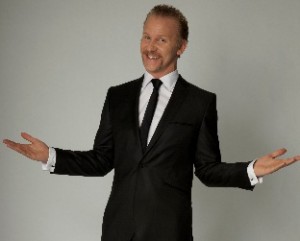By Kim Voynar Voynar@moviecitynews.com
Sundance Review: POM Wonderful Presents: The Greatest Movie Ever Sold
I’ll say this about Morgan Spurlock: there’s no one quite like him. Especially when he’s wearing comfy Merrell shoes (hey, they have great arch support) while feeling Ban fresh!, and driving a stylish Mini-Cooper plastered with ads while sipping some refreshing POM Pomegranate juice on his way to catch a fight on JetBlue Airlines.
With POM Wonderful Presents: The Greatest Movie Ever Sold, the vanguard documentary filmmaker has made a ballsy, groundbreaking film about branding in movies, funded entirely by branding partners featured prominently throughout the film. What’s genius about Spurlock’s idea is that he unmasks the way branding has become integrated into movies by being completely transparent about his own efforts to fund his documentary through branding partnerships in much the same way that studios partner with brands for big tentpole movies like Iron Man.
The companies interested in partnering and the ones that arent, the marketing directors of major brands who laugh at him outright for his cheek in even asking, the ones who feign interest only when the camera’s on … we see all of it in the movie, edited for maximum impact, of course.
On the one hand, it’s a tongue-in-cheek, humorous examination of the world of branding, but on the other hand, it’s deadly serious business. At one point in the film, Spurlock works with a company that specializes in “neuromarketing” to help develop the trailer for the film by determining how his brain responds to images of craving, sex and fear. He undergoes a branding psychoanalysis to determine what his personal “brand” is. He hires agencies to help him acquire branding partners, gets turned down by a lot of major brands, but ends up acquiring a bevy of smaller companies, including POM Wonderful Pomegranate Juice, Merell Shoes, and Mini-Cooper. Conversations with experts including Noam Chomsky and consumer advocate Ralph Nader help round out the perspective on the issues at hand.
But as the project progresses, Spurlock begins to question to what extent he’s compromising his own integrity, particularly when his lawyer starts explaining the terms of the many partnership contracts he’s agreed to, which specify such things as what he’s allowed to drink on camera (POM and only POM) and what he can and cannot say (saying this particular brand is the greatest ever is probably okay, saying all competing brands are worthless shit, not so much).
One of his ideas is to have three commercials for branding partners run during the film, and when he has a meeting with the POM folks to pitch the ideas he has, they glibly shoot them all down and ask him to try again — but this time using their own ideas. (In their defense, one of his ideas, which may or may not have been staged — it’s hard to tell with parts of this film — proposed Spurlock touting the blood-flow and erectile dysfunction benefits of pomegranate juice, with the camera panning back to reveal him sporting a spectacularly large erection.) How much is Spurlock willing to give up his artistic vision for the sake of getting his film funded?
It’s a clever conceit that pulls back the curtain not only on the way in which advertising has become completely interwoven into our lives by showing us the back-room conversations, scientific research, and layers of manipulation that make it all happen. Moreover, the film shows how we as consumers have come to enable the proliferation of advertising into nearly every aspect of our lives simply by assuming that’s just the way it is and always will be.
Spurlock drives the stake in further in the last third of the film when he starts coming up with a slew of ideas for the sweeping, integrated advertising campaign that will get word out about the film — an aspect of the project that’s particularly crucial given contractual obligations that specify his obligation to deliver 600,000,000,000 consumer impressions and a $10 million box office take.
Toward that end, Spurlock and his team come up with a massive cross-platform campaign that includes everything from collectible soft drink cups at his gas station sponsor, to ads on pizza boxes driving customers to a website, to an embedded commercial shown to captive customers on JetBlue flights, to buying banners, bus ads and a mural in a Florida school district, to Spurlock himself wearing a Nascar-inspired ad suit on television.
By way of further making his point, Spurlock takes his camera to Sau Paulo, Brazil, where in September 2007 all outdoor advertising — billboards, buses, even cabs — was scrubbed off the city, to show us what the rest of our world might look like without ads saturating every waking moment. Imagine Times Square with no giant ads blaring down at you, or driving through LA and not being visually accosted by billboards advertising upcoming weekend openers.
The Greatest Movie Ever Sold is very funny at times, but the questions it raises with regard to our advertising-saturated existence will make you think twice about the way in which your own decisions are being driven largely by corporations inundating you with advertising. Spurlock’s latest may seem a bit gimmicky on the surface, but it’s making a very astute point … beneath all the ads. Now if you’ll excuse me, I’m dehydrated from the altitude here in Park City, and for some reason I’m really craving a bottle of POM.
















